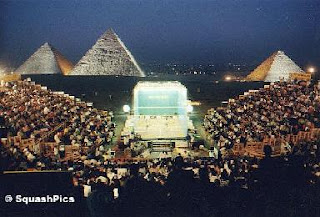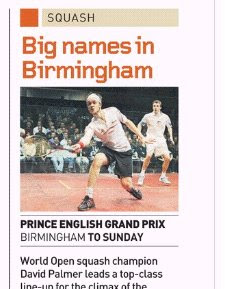 When I read that PSAlive were to webcast the finals of the British Open 2007 for free, I quickly recovered from my strop at not being able to attend (thanks to Virgin Trains' exhorbitant fares - see this post) and eagerly logged on at 7.45pm.
When I read that PSAlive were to webcast the finals of the British Open 2007 for free, I quickly recovered from my strop at not being able to attend (thanks to Virgin Trains' exhorbitant fares - see this post) and eagerly logged on at 7.45pm.
The problem was, so did hundreds (thousands?) of others ...
I initially managed to hear some of the commentary, and also managed to log on to the live chat, which is an excellent idea that I didn't know was a feature of the service. Due to the over-running of the women's final, the men's did not start until aroun 8.30pm, and by this time I guessed a few people would have lost patience with the server problems. All credit to the PSAlive team for offering the broadcast for free - a marketing idea that obviously proved too successful due to the terminal volume of traffic that tried to access the match.
All credit to the PSAlive team for offering the broadcast for free - a marketing idea that obviously proved too successful due to the terminal volume of traffic that tried to access the match.
Hopefully some of the visitors might be tempted to part with a few quid to access live events in the future or download archive matches.
Though the tournament lacked (probably) the best player in the world, it appears that it was very successful, with photos of the crowds at each round showed very encouraging attendance.
The progression of the players largely went to seeding, but this Open seemed to save the best till last, with Greg Gaultier's coming of age to take his biggest prize to date and Rachel Grinham's epic win over reigning champion Nicol David to take her third title.
PSAlive
Hot topics
Most popular | Canary Wharf 2009 | squashblog is 2 | Nick & Jenny in the mirror | What's rocking squash?
Tuesday, 25 September 2007
PSAlive at the BO? Not quite ...
Posted by squashblogger at 20:53 3 comments
Topics: media coverage, technology, tournament
Thursday, 20 September 2007
Not a spectator sport? Ditch the dogma
 There's a particuarly cruel remark about the great game in the Guardian this week.
There's a particuarly cruel remark about the great game in the Guardian this week.
Barney Ronay's article on the glut of world championships being simultaneously held across a range of sports draws an unwarranted parallel, suggesting that squash is not a game for the spectator:
"Women's football, for example, is a perfectly good sport, in the same way squash and 10-pin bowling are: great if you're taking part, but do we have to watch them?"
Ronay should get himself up to Manchester this week to see some of the world's finest athletes compete in the world's most exciting sport.
Better still, take a trip to either Madrid or Bermuda to catch squash's own world championships in October and November.
Stumbling across this negative representation of squash, it suggested to me that this is precisely the thing that the newly-formed marketing department at England Squash should be keeping keeping an eye out for.
The article in full
Posted by squashblogger at 15:58 2 comments
Topics: image, media coverage, participation
Monday, 17 September 2007
Wolverhampton title timely for Beachill
 Last week's win for Lee Beachill's in the Wolverhampton Open 2007 could not have come at a better time.
Last week's win for Lee Beachill's in the Wolverhampton Open 2007 could not have come at a better time.
The former world number has been out of the top ten rankings for nine months, and the win at the Edgbaston Priory club will surely give him confidence going into the British Open - a title he has never won.
Having seen Beachill many times in tournaments, he appears to be a player whose state of mind affects the outcome of his games more often than his physical condition.
An excellent mover and one of the best exponents of a good-length game, the 29 year-old from Yorkshire also possesses a cache of attacking shots founded on deception - weapons seemingly at odds with the stereotype of an attritional player.
However he never entirely looks like he is enjoying his work on court, with a dogged look on his face that belies a fierce determination. Sometimes the head goes down, but this is rarely followed by the capitulation that this kind of body language displays in other, more emotive, players.
More recently he seems to have suffered from a loss in self-belief that has seen him go out of events in earlier rounds. The reasons for this are unclear, though to many squash players with families, constant world travel is a strain and can impact on their motivation - especially when they have been, like Beachill, the best-ranked player in the world.
To train and focus on reaching the same heights once more must require a huge mental, as well as physical, effort. Losing the Super Series
Losing the Super Series
If one particular event sticks in my mind as a point when his confidence must have taken a huge knock, it is the final of the 2006 Super Series. Anthony Rickett's request to change the ball during a game caused chaos, with the officials unsure as to whether this was allowed in the rules. Beachill challenged the request, and was particularly miffed by the lack of guidance available at such an important time in the match. He walked off incensed after losing, clearly unsettled by what had happened.
He had the right to feel let down, though it subsequently turned out that his Australian opponent had acted within the letter (if maybe not the spirit) of the Super Series laws.
With the top ten in the men's game stronger than ever, Beachill will find it harder to get back up the rankings, especially now that Ramy Ashour has graduated from the juniors and looks set to dominate the senior ranks.
Having followed his career, I'd like to see the likable, self-effacing Pontefract man have another (maybe final?) assault on the rankings and be competing in some PSA finals pretty soon.
The win in Wolverhampton provides an excellent platform.
Wolverhampton Open 2007
Posted by squashblogger at 09:45 1 comments
Topics: men's game, officiation, tournament
Friday, 14 September 2007
A step in the right direction
 Very encouraging to read that England Squash's new Chair, Zena Wooldridge, is planning the creation of a Marketing and Communications Team within her organisation.
Very encouraging to read that England Squash's new Chair, Zena Wooldridge, is planning the creation of a Marketing and Communications Team within her organisation.
Her comments were made in Issue 5 - 2007 of Squash Player magazine:
"... the idea is that Club Services would come under Marketing and use part-time external consultants (with experience in leisure and fitness industry) to provide expertise when needed."
I would have also liked to have seen "media consultants" included in the parentheses above, but at least this seems that a conscious effort (and the funding to back it up) is being devoted to widening participation by actively "selling" the sport.
As I had argued before, innovative marketing and media engagement is needed as much - if not more - than grass roots work.
England Squash
Posted by squashblogger at 09:23 0 comments
Topics: governing bodies, image, marketing, media coverage, participation, partnerships and sponsorship, popularity
Sunday, 9 September 2007
English Grand Prix 2007
 I had planned to attend the British Open in Manchester this autumn, however the prohibitive cost of a London-Manchester train ticket and accompanying accommodation meant that I would have to find another tournament (London events where art thou?).
I had planned to attend the British Open in Manchester this autumn, however the prohibitive cost of a London-Manchester train ticket and accompanying accommodation meant that I would have to find another tournament (London events where art thou?).
There were a few to choose from, given the busy schedule of events this season. A £15 return fare on Chiltern railways to Birmingham made up my mind, and I headed up to the west Midlands for some squash and a balti.
Though the English Grand Prix hadn't attracted the same quality of entrants as the British Open, it wasn't the standard of squash that somewhat clouded my experience in Birmingham ...
For the Saturday (semi-final) night that I attended was the first evening of squash I'd seen that was dominated not by the players, but by the officials.
The first semi-final saw Australian David Palmer take on James Willstrop, with the World Champion Palmer looking lean and fitter than his much younger opponent. The match see-sawed back and forth, and from early on destined to go the distance - Willstrop using a greater range of shots to deceive his opponent, while Palmer content to work the ball to a more consistent length. From my sidewall vantage point I couldn't see the referee and marker, and apparently there was a third official in place in order to give the "majority decisions" that were called at a number of disputed moments.
From my sidewall vantage point I couldn't see the referee and marker, and apparently there was a third official in place in order to give the "majority decisions" that were called at a number of disputed moments.
I've seen this system in operation before with three players used to officiate on close calls at Canary Wharf, but on this occasion (if the same system was in place), it didn't seem to work, and Palmer in particular came off worse. A disputed call when Willstrop was at match point did not inspire much confidence, as the officials seemed to look to the players for direction.
This was a close match between two evenly matched players, but Palmer can feel justified in feeling frustrated - the inconsistency in decision making clearly upset his rhythm. Given his tendency to vent his frustrations, all credit to him for accepting the decisions with grace. Taking a stroll round the Aston Webb Great Hall during the break between matches, I was able to appreciate what a dramatic venue for squash the promoters had found. The entrance of the players from high up above the stage was a nice touch, but seemed a little melodramatic given the relatively small number of spectators.
Taking a stroll round the Aston Webb Great Hall during the break between matches, I was able to appreciate what a dramatic venue for squash the promoters had found. The entrance of the players from high up above the stage was a nice touch, but seemed a little melodramatic given the relatively small number of spectators.
Though the back wall spectator area was sold-out, the sidewall section where we were seated had round tables with unreserved seating. This is more comfortable for the likes of tall people like squashblogger, though usually means that the promoters have sadly sold fewer tickets than expected (the tickets that were being given away during the week seemed to confirm this).
The crowd had some familiar faces, and seemed mostly to be from the squash community. Given the fact that the hall was in the middle of a campus university when the students are on holiday, this was not surprising - unlike the aforementioned Canary Wharf tournament, the event was unlikely to attract "passing" spectators.
To the promoters' credit, they seemed particularly attendant to the paying punters' experience, and we were asked a couple of times if we would like to move to the back wall to get a better view. This we duly did (thanks Paul Waters), only to see Greg Gaultier's match against compatriot Thierry Lincou (looking slightly sluggish compared in comparison after a five-gamer the previous night) similarly marred by poor officiating.
This we duly did (thanks Paul Waters), only to see Greg Gaultier's match against compatriot Thierry Lincou (looking slightly sluggish compared in comparison after a five-gamer the previous night) similarly marred by poor officiating.
Gaultier, like Palmer, is less fractious now than his younger self, but he lost his temper a number of times here, and justifiably so. On the receiving end of some poor decisions (by this time the groaning back wall crowd had begun to sense that this was to be the common theme of the night), the Frenchman repeatedly asked the officials to justify why a let was given. On one occasion, Lincou simply slipped over - a good five feet away from his opponent - and a let was given. An incredulous Gaultier asked why, only to be told to shut up and get on with the game. The most bizarre incident occurred in the third, with Gaultier conceding that a ball was down. The officials obviously did not see whether the ball was indeed down, and asked the players for clarification. At this point something was lost in translation, with Lincou repeating the word "concede" - which the officials took to mean that he - and not Gaultier - was conceding the point!
The most bizarre incident occurred in the third, with Gaultier conceding that a ball was down. The officials obviously did not see whether the ball was indeed down, and asked the players for clarification. At this point something was lost in translation, with Lincou repeating the word "concede" - which the officials took to mean that he - and not Gaultier - was conceding the point!
I felt that the officials repeated requests for "Mr Gaultier" to get on with the game were masking the fact that they had lost touch with the match (the score was also misquoted at least once). The crowd new it, and even Malcolm Willstrop, sitting to my right, giving a withering shake of the head at the proceedings.
Gaultier lost in five, clearly unsettled by the repeated breaks in the games. Lincou did what he is best at - keeping his head down and plugging away until his opponent makes mistakes.
They were introduced as "friends" as the came on to court, but the unlikely provocation that they had to contend with might have gone someway to test that claim, given the number of times it was implied they had to sort sticky situations out for themselves. There will always be times in a fast-moving game like squash when players are called upon to show sportsmanship and act honestly. But both semis of this tournament strained this principle to unreasonable lengths. Maybe the fact that this was the first time I'd seen the officials have a bad game means that their usual "invisibility" is indicative of assured professionalism and excellent judgement. But tonight, they did have a shocker.
There will always be times in a fast-moving game like squash when players are called upon to show sportsmanship and act honestly. But both semis of this tournament strained this principle to unreasonable lengths. Maybe the fact that this was the first time I'd seen the officials have a bad game means that their usual "invisibility" is indicative of assured professionalism and excellent judgement. But tonight, they did have a shocker.
The trophy was won on Sunday by Willstrop in another game that went the distance - the English number one's "who dares wins" attitude during an attacking fifth game finally breaking down the Gallic challenge.
Right: a video of the last point of the final, as recorded by a spectator and posted on YouTube.
Willstrop beats Lincou 11/8, 11/8, 9/11, 7/11, 11/3 (77 mins)
Posted by squashblogger at 21:14 1 comments
Topics: men's game, officiation, tournament
Saturday, 8 September 2007
Freebie glossy covers English Grand Prix
 Nice to see that the glossy sport magazine given away to London commuters on a Friday devoting a small preview section to this week's English Grand Prix in Birmingham.
Nice to see that the glossy sport magazine given away to London commuters on a Friday devoting a small preview section to this week's English Grand Prix in Birmingham.
Myfreesport magazine carries at least one decent interview weekly, with pretty decent photography throughout, considering it's being given away.
I keep a look out for squash articles, as the content tends to be pretty eclectic. And lo and behold, last Friday carried an article on the Birmingham event.
More than can be said for our quality dailies - and I rather fear that the BBC's coverage this season might be diminished, given the fact that the RSS feed at the top of this page hasn't changed for a while.
Myfreesport magazine
Posted by squashblogger at 21:11 1 comments
Topics: media coverage, tournament

